- Home
- Marge Piercy
The High Cost of Living
The High Cost of Living Read online
EARLY BIRD BOOKS
FRESH EBOOK DEALS, DELIVERED DAILY
BE THE FIRST TO KNOW—
NEW DEALS HATCH EVERY DAY!
Also by Marge Piercy
Novels
Going Down Fast, 1969
Dance the Eagle to Sleep, 1970
Small Changes, 1973
Woman on the Edge of Time, 1976
The High Cost of Living, 1978
Vida, 1980
Braided Lives, 1982
Fly Away Home, 1985
Gone to Soldiers, 1988
Summer People, 1989
He, She And It, 1991
The Longings of Women, 1994
City of Darkness, City of Light, 1996
Storm Tide, 1998 (with Ira Wood)
Three Women, 1999
The Third Child, 2003
Sex Wars, 2005
Short Stories
“The Cost of Lunch, Etc.”, 2014
Poetry Collections
Breaking Camp, 1968
Hard Loving, 1969
4-Telling (with Emmett Jarrett, Dick Lourie, Robert Hershon), 1971
To Be of Use, 1973
Living in the Open, 1976
The Twelve-Spoked Wheel Flashing, 1978
The Moon Is Always Female, 1980
Circles on the Water, Selected Poems, 1982
Stone, Paper, Knife, 1983
My Mother’s Body, 1985
Available Light, 1988
Early Ripening: American Women’s Poetry Now (ed.), 1988
Mars and Her Children, 1992
Eight Chambers of the Heart, 1995 (UK)
What Are Big Girls Made Of, 1997
Early Grrrl, 1999
The Art of Blessing the Day: Poems with a Jewish Theme, 1999
Colors Passing Through Us, 2003
The Crooked Inheritance, 2009
The Hunger Moon: New and Selected Poems, 1980–2010, 2012
Made in Detroit, 2015
Other Works
“The Grand Coolie Damn” in Sisterhood Is Powerful, 1970 (pamphlet)
The Last White Class, (play coauthored with Ira Wood), 1979
Parti-Colored Blocks for a Quilt, (essays), 1982
The Earth Shines Secretly: A Book of Days, (daybook calendar), 1990
So You Want to Write: How to Master the Craft of Writing Personal Narrative, 2001; Enlarged Edition, 2005
Sleeping with Cats, (memoir), 2002
Louder: We Can’t Hear You (Yet!), The Political Poems of Marge Piercy, 2004 (CD)
Pesach for the Rest of Us, 2007
My Life, My Body (Outspoken Authors), (essays, poems, and memoir), 2015
The High Cost of Living
A Novel
Marge Piercy
one
Leslie was balanced on the hard cushion of an antique chair designed for someone with a three-cornered behind. In front of her, too close, Hennessy straddled a chair backwards and loomed over her, telling loud anecdotes intended as far as she could guess as advertisements. “The minute Ted left the room, she walked over to me and stood there, just looking me up and down. Provocative. I could see she wasn’t wearing a bra.”
“Lots of women don’t,” Leslie said between stiffening lips. “It isn’t mean to be provocative.” She slumped forward. She too was not wearing a bra. Was that what had pinned him to her of all the women milling around this apartment? Some flaw, see you were asking for it.
“Listen, she knew. Then she leaned way over with her tits sticking in my face and she said”—he attempted to copy a languid expression, lifting one beefy shoulder—“she said, ‘Mark, are you a good lay?’ Just like that.” He paused for reaction.
She stared at him, she hoped impassively. He had an almost handsome craggy face spoiled by a too square, too heavy jaw and an expression that was a perennial pout. His body, the upper part of his face seemed older than he was—a second-year graduate student like herself—while the lower half of his face seemed trapped in sulky early adolescence. If she said nothing, nothing at all, he might go away. But exactly like her, he seemed to know no one at the party. It was Cam’s fault they were here, because Cam was acting in the damned play she had also gone to tonight. The Importance of Being Earnest. Support dead fags. She was itchy with discomfort in this fancy room with its mixture of wonderful-to-look-at, impossible-to-use antiques and modern couches like velvet-covered marsh-mallows. The walls of the livingroom were decorated with drawings of naked women, and she did not like that; she did not like the way men used bodies like hers to pin up on their walls and sell toothpaste and decorate glassware and magazines.
“So I said, ‘Well, nobody’s complained yet.’ ‘No?’ she said. ‘Let’s see.’ And she put her hand on me, right you know where.… You’re awful quiet, Leslie. Don’t you believe me?”
She tried waiting him out, but he waited too. Could he really think not wearing a bra was an automatic general come-on? She had on a denim shirt, and her concession to the party was a fancy leather vest covered with an intaglio flowery design, two years old but still beautiful, that Val had given her for their second anniversary. “Sure I believe you, Hennessy.” Politeness got the best of her.
“What’s this Hennessy bit? Call me Mark. Jesus, we see each other every day.”
Almost. They had the same boss. She refused to call him Mark. Formality was a poor defensive weapon but a comfort. He was inching his chair forward again until he had walked it well into the space she counted as her own, forcing her against the misshapen back of the chair. She imagined lashing out with her foot, a quick chop to topple him. Her mouth twitched in a quarter smile.
Taking that for encouragement, he reached for her hand. Big hot grasp. She could not kick him, because they worked together for George: Professor Sanderson. George was her bread and butter, her thesis adviser, almost her fate. George had brought her along to Detroit and the University when he had changed jobs, carried her along with an appointment as his research assistant with his files and his map collection. Therefore, she could not kick the chair out from under Hennessy, but she could pull her hand away. “Sorry. I have to pee.”
Through the crowded party she nudged her way, past the couples dancing, the thud and growl of the speakers. She got stuck next to a long glass table. On it besides glossy art books was an ashtray in the shape of a woman. It wasn’t the kind of cheap thing her brothers might have had, like a hula girl on a highball glass. It was artful, sort of African, and therefore all the more shocking, as it was supposed to be. The butts ground out on the woman’s hollowed belly jarred Leslie. She gritted her teeth, suddenly hating the whole room of strangers. There didn’t seem to be another woman alone who wasn’t trying to pick up one of the available men. What was she doing here, among women who looked through her? She wanted to break the ashtray, but there were too many people around. She did something else, fingering her vest. She had seen an extension in the hall. She scooped up the phone as she walked past and took it on its long cord into the bathroom, shutting the door.
She dialed Valerie’s number in Grand Rapids. Let the owner of the ashtray finance her call, Paul What’s-his-name. Creighton. The director of the play. Her heart was pounding in her throat, her wrists. It rang and rang. Why did she think Val would be home on a Friday night? Because she did not want Val to be with anyone else. The phone was answered. She shut her eyes, shut them tight, to hear Val’s high voice.
“I’m sorry, the number you have dialed is not a working number. This is a recording. Please check your number and try again.”
She dialed Grand Rapids Information. “Do you have a new listing for Valerie Mendoza?”
They had no listing. Broke? Phone shut off? But Val had not vanished; she had moved
in with somebody and that was the truth. She knew it. Let it not be Lena. But she was sure it was.
Enough. Time to get out. She wriggled along, awkward, diffident, to the bedroom at the end of the hall. Even the bedroom was full of people drinking and talking. There she saw Cam Rogers sitting against the bedroom wall, beside the bed heaped with coats. Cam worked for George too, as his secretary. She’d sit beside Cam and pay her a few compliments about the play before rescuing her pea jacket from the bed and going home where she belonged. “You were wonderful,” Leslie began, squatting down. But Cam wasn’t listening. Her head tilted against the blue wall, she brooded. “Is something wrong, Cam?”
Slowly Cam turned, focusing on her. Drunk? “Hi there, old Leslie. You liked it, huh?”
She had begun to be casually friendly with Cam, a big amiable scattered woman who when she wasn’t working for George studied dramatics and acted with the local theater group. Cam did not attract her; she was too obviously heterosexual, even victimized, a big soft woman not quite able to carry off her own act. Her hair was bleached and she made jokes about dark roots; her eyes were elaborately made up in two shades of eye shadow and her long lashes seemed to molt. Her daring purple jumpsuit was creased in the wrong places where she had been slouching against the wall. Leslie could take one look at Cam and draw in with the scent of her musky perfume that Cam would always be falling in love with someone who wouldn’t love her back, and now Leslie searched where Cam was bleakly staring and tried to decide who might be making her unhappy tonight.
A girl wearing a long bottle green velvet dress was sitting on a hassock, her back toward them, kicking off her uncomfortable shoes. She balanced a wineglass on the palm of one hand, running the other through fine wavy light brown hair that shimmered over her shoulders and halfway down her back, smooth and controlled as satin. “All right, it can be amusing! But to pretend you’re fulfilling some grand role in society, that’s silly!”
The voice was familiar: low pitched, husky, but knife-edge precise in its diction. Yes, it had been Cecily’s voice in the play. Honor Rogers. “Is that your sister?” she asked Cam.
Cam nodded heavily, as if her neck were too weak to support her head. “My baby sister.” She nodded again. “Paul’s letching for my very own little sister.”
“Paul?”
“Our director. Him.”
The owner of the ashtray, the apartment, the party. He was in his middle or late forties and chunkily built with a face carved in broad lines and dark angles, crumbling only a little. Leslie asked Cam, “Are you worried? Or do you just think you ought to be?” She had never had a sister; the idea intrigued her. Younger sister, vulnerable, looking up to you.
“It’s all my fault. I brought her down to try out. I never thought she’d get the part, I just wanted her to get a kick out of it.… I had to do some fast talking to persuade Mama too.”
Paul squatted, saying something into Honor’s ear. When he stopped she flung back her long swan throat and laughed till her body shook. Paul grinned, with his teeth showing, his forehead wrinkled. Her dad’s age. That annoyed her. Her boyish father would look at his wife and three sons and a daughter and two dogs and seem to wonder who the hell they were. How had he come to wake up with these noisy carping strangers on his back? The way he would look at them coldly, blankly, especially when he’d been drinking. This man was more self-important, more aggressive. She found his lust ugly, butt grinding out on the ceramic belly. Now he was taking Honor’s arm, leaning close again, and the girl swung around to face them, freeing herself with a shrug.
“Did you have fun playing Cecily?” Leslie asked.
Somehow it was the right question. “Yes, but not as much as I’d expected. It’s work, actually. Stupid rote work.”
“Our Cecily doesn’t approve of work. She wants to swallow a part like a birth control pill,” Paul said wryly.
“The costumes are fun, anyhow.” Honor ignored him, looking at them out of enormous eyes that seemed above the bottle green velvet such a pale brown as almost to be golden, like a cat’s eyes. Her forehead and cheekbones were high, her nose long, her skin pale and rosily translucent. Her mouth and chin were delicate. “I wanted to come to the party tonight in mine—all frills and ribbons and a dear ridiculous parasol. But Paul wouldn’t let me. He was petrified I might spill something. They rent their costumes, you know.” Her eyes shone gold with mischief.
Leslie sat up straighter against the wall. Nineteen? Even though Honor was, odds on, talking to her to annoy Paul, turning her back on him as part of the same game as flirting outrageously five minutes earlier, she enjoyed the moment. “I’m Leslie McGivers. I work with your sister.”
“Oh, Cam’s talked about you.” Honor raised her thin arrogant eyebrows. “She says you’re brilliant. That George”—Honor drawled the name, looking under her lashes to see if Leslie noticed she used his first name. Ah, she was young—“brought you with him from Grand Rapids. That you have a black belt in kung fu and George treats you like his daughter and you eat rapists for breakfast.”
“A brown belt in karate.” But look at me with your golden eyes. Nobody has looked at me anything like that way for months. Christmas. Val with the snow in her shining black hair.
“Cam admires you, so I think you must be special. She hardly ever admires another woman.” Honor beamed at her sister.
What else had Cam said? That she was a dyke? Paul glanced at her quickly then through her. She did not register on him. He had risen to his feet and he stood now at Honor’s shoulder peering down into her green dress, at her breasts. But Leslie did not think Cam had guessed. No, Honor flirted with everyone; probably she flirted with the mirror when she brushed her teeth.
Another woman who had just come in slipped her arm through Paul’s. “Come and dance. It’s time for our ingenue to go home to her mama.… You know, Cam, I have a little sister too, but I keep her where she belongs. At home in the closet.”
Honor rose. She was tall, perhaps five eight and a good two inches taller than Leslie, who instinctively stood with her. “It is time for me to be in bed, even if I don’t sleep in a closet like Cinderella.”
Groggily Cam stumbled to her feet and began pawing at the coats on the bed. Leslie took hers as it heaved up. As they went past the crowded livingroom she saw that Hennessy had pinned another woman against the wall, hunched over her with his extended arm blocking her escape. “… and when I opened my eyes, there she was climbing into bed with me …” Together they picked their way out and went down the broad stairs. Cam tripped on her big clumsy shoes and Leslie caught her under the elbow, set her back on her feet.
“You’d better drive,” Leslie said to Honor.
“But I hate machines. I don’t know how!”
“I’ll drive, I’ll drive,” Cam muttered, fumbling for her keys.
It was an old dust-colored VW with one fender bright blue. “Why not take a taxi?” Leslie suggested. “I’ll go up and call one for you.”
“Mama would be upset.”
“Yes, we do not upset Mama!” Cam declaimed. “It costs too much.”
“How would she know? Get the car in the morning.”
“She’d know.” Cam giggled. “She’s sitting up waiting. She always waits. She has to check us in and check us over.”
“Camille!” Honor sounded icy. “She worries. We don’t live in a neighborhood where you stroll around at night.” She put her hand on Leslie’s sleeve. “Could you drive us? Please.”
“I’m not drunk.” Cam leaned on the fender, still going through her purse. “The keys’re here somewhere. I can drive perfectly.”
She saw Paul at the second-floor window looking out at them, probably trying to decide if it was worth his while to come down. He turned then, as if deciding. “All right,” Leslie heard herself say. “But I hardly know the city.” Now how the hell would she get back home from wherever?
Thus she found herself patiently driving the battered VW whose gears slipped, whose brake
s were mushy, whose choke did not appear to be connected with anything, while Honor gave her directions. “You turn at those lights, or maybe it’s the street after, I’m not sure. Let me see. Not that one. Oh, that was it! We’ve gone past it!”
“The virginity of a younger sister,” Cam was saying from the back seat in a loud flat voice about three inches from Leslie’s ear. Cam’s chin came to rest on the back of the driver’s seat. “It’s confusing. The virginity of most people is like they haven’t got around to it. Except most people aren’t virgins. But Honor—it’s a positive thing. Like a Samoan princess.”
“Be quiet, Cam. Or help me give directions!”
Finally Leslie parked in a bus stop and looked at a city map from the glove compartment. Honor and Cam lived on the near northwest side about six blocks off Grand River, and she plotted a reasonable route via the John C. Lodge Freeway and then south on Wyoming. “You’re delightfully practical, Leslie,” Honor said. “I’m always so tangled up in my own fantasies that I never notice the obvious, such as where I’m being driven. Also, it’s so dull-signs that tell you not to do things. The only street names I ever remember are the pretty ones, the old French names like Beaubien and Saint Antoine, even if everybody pronounces them wrong. But they’re all slums or factories. Or rubble fields. I can’t imagine why you’d choose to move here.”
“This is a metropolis compared to Grand Rapids, and Grand Rapids was wildly cosmopolitan after Ludington.”
“Is that where you come from? Ludington? That’s where the ferries cross, isn’t it?”
“The Chesapeake and Ohio Car and Auto Ferry. Have you taken it?”
“Never,” Honor said tragically. “We only noticed it on the map, Mama and I. One of those things you imagine doing. I dare say it’d be disillusioning—a second rate imitation of a real voyage on a real sea.”
“With a bit of wind you wouldn’t think so.”
“Really? Does it get stormy?”
“A tanker broke up out on Lake Michigan the year I left home. Broke in half in a storm. Nobody got off.” Defending her home now, as if she’d ever go back. But Honor had annoyed her. Really, she might be beautiful but she was ridiculously affected. Probably gone to some fancy private schools where they all tried to sound British.

 Woman on the Edge of Time
Woman on the Edge of Time The Cost of Lunch, Etc.: Short Stories
The Cost of Lunch, Etc.: Short Stories Made in Detroit: Poems
Made in Detroit: Poems Sleeping With Cats
Sleeping With Cats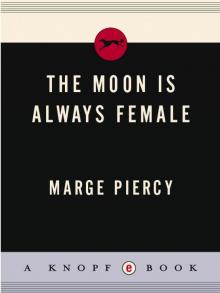 Moon Is Always Female
Moon Is Always Female The Longings of Women
The Longings of Women Circles on the Water
Circles on the Water Summer People
Summer People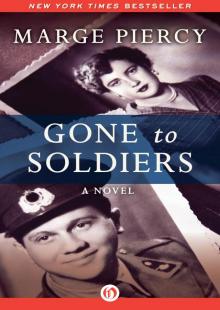 Gone to Soldiers: A Novel
Gone to Soldiers: A Novel The Hunger Moon: New and Selected Poems, 1980-2010
The Hunger Moon: New and Selected Poems, 1980-2010 Vida
Vida Fly Away Home
Fly Away Home He, She and It
He, She and It So You Want to Write
So You Want to Write Small Changes
Small Changes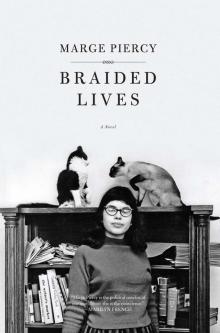 Braided Lives
Braided Lives Lord Valentine's Castle
Lord Valentine's Castle Dance the Eagle to Sleep
Dance the Eagle to Sleep City of Darkness, City of Light
City of Darkness, City of Light The High Cost of Living: A Novel
The High Cost of Living: A Novel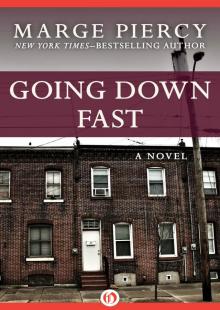 Going Down Fast: A Novel
Going Down Fast: A Novel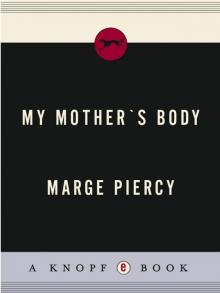 My Mother's Body
My Mother's Body Storm Tide
Storm Tide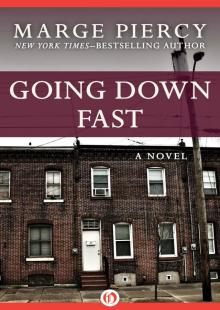 Going Down Fast
Going Down Fast The Third Child
The Third Child The Hunger Moon
The Hunger Moon The Cost of Lunch, Etc.
The Cost of Lunch, Etc. Sex Wars
Sex Wars The High Cost of Living
The High Cost of Living Made in Detroit
Made in Detroit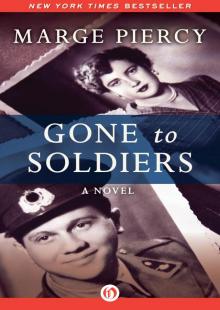 Gone to Soldiers
Gone to Soldiers